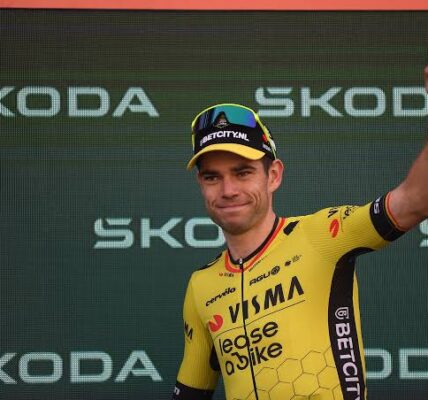How the Springboks’ No 10 options will keep the All Blacks guessing
By
While the Springboks remain focused on their opening Rugby Championship double-header against the Wallabies, much of South Africa is already looking ahead to the showdown with the All Blacks in Auckland, and a potentially game-defining call at No 10.

Rassie Erasmus recently stated that he has no intention of installing one of Handré Pollard, Manie Libbok or Sacha Feinberg-Mngomezulu as the Springboks’ first-choice No 10.
It was a fascinating admission by the Springboks head coach on the eve of the Rugby Championship, and less than a month out from the all-important clash with the All Blacks at Eden Park.
“Everything depends on who our opposition is on the day and what our plan is. I like to believe it gives us options,” said Erasmus.
“By not having a first-choice fly-half, it makes it more difficult for opposing teams to analyse us and makes us less predictable.”
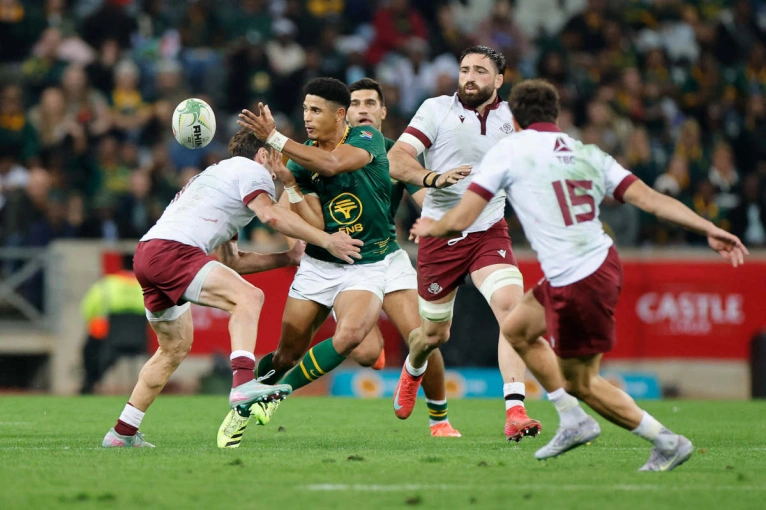 Feinberg-Mngomezulu has started two of South Africa’s four games this year at 10, including their most recent outing against Georgia (Photo Phill Magakoe/AFP via Getty Images)
Feinberg-Mngomezulu has started two of South Africa’s four games this year at 10, including their most recent outing against Georgia (Photo Phill Magakoe/AFP via Getty Images)
There’s a lot to unpack here.
South Africa’s selection process has evolved over the past decade, with the focus shifting from the starting XV to the matchday 23, and more recently from the 23 to the extended squad.
Squad depth has been the key to their sustained success.
The Boks relied on their bench to clinch the 2019 and 2023 World Cup titles, while Erasmus used 35 players over the course of a gruelling yet successful 2024 Rugby Championship campaign.
Erasmus’ recent statement can be taken at face value when you consider that Pollard, Libbok and Feinberg-Mngomezulu have all enjoyed starting opportunities over the course of the current World Cup cycle.
More should be read, however, into the selections for the ‘marquee Tests’ during this period.
The Boks coach has favoured a specific individual or combination in certain high profile matches where the result has been all-important – namely the two-match series against Ireland, as well as against New Zealand last year, plus the one-off against England at Twickenham in November.
These selections – and indeed the performances – go a long way towards answering the hypothetical question of who would play at No 10 if the World Cup final was staged this Saturday.
The Auckland clash is so important that Erasmus will have no choice but to show his strongest tactical hand at No 10, and across the matchday squad.
In the context of the 2025 Test season, that ‘final’ will be staged on 6 September, when the Boks face the All Blacks at Eden Park.
The Auckland clash is so important that Erasmus will have no choice but to show his strongest tactical hand at No 10, and across the matchday squad.
This game may decide whether South Africa retain the Freedom Cup, and may also shape the race for the Rugby Championship title.
The prospect of claiming South Africa’s first win at Eden Park since 1937 will serve as further motivation for Erasmus’ charges.
HOW THE BOKS BECAME UNPREDICTABLE
Even those who have played and led teams at the highest level have given up on trying to predict Erasmus’ selections.
Former players such as John Smit, Victor Matfield and Schalk Burger – who all played under Erasmus over the course of their decorated careers – made the point shortly after the Boks clinched the 2024 Rugby Championship title in Mbombela.
With regards to the fly-half position, the situation is a lot healthier than it was back in 2022, when the Boks lost their only experienced No 10s – Pollard and Elton Jantjies – midway through the Rugby Championship.
The subsequent tour to Europe forced Erasmus and then head coach Jacques Nienaber to explore other starting options such as Damian Willemse and Libbok, while Feinberg-Mngomezulu got a run with the South Africa A side against the Bristol Bears.
Libbok travelled to the 2023 World Cup as the only specialist fly-half in the squad, and with a question mark over this goal-kicking.
When Pollard returned to the group ahead of the knockout stages, the Bok coaches favoured the dynamic of Libbok starting and Pollard finishing.
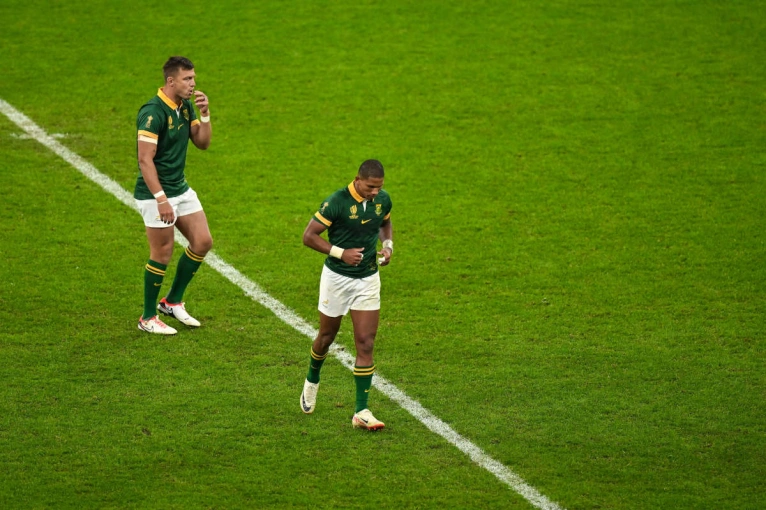 Pollard replaced Libbok early in the second half of South Africa’s RWC quarter-final against France, guiding them to a one-point victory (Photo Brendan Moran/Sportsfile via Getty Images)
Pollard replaced Libbok early in the second half of South Africa’s RWC quarter-final against France, guiding them to a one-point victory (Photo Brendan Moran/Sportsfile via Getty Images)
Libbok was instrumental to South Africa’s success in the early stages of the quarter-final against France, while Pollard came off the bench to nail a game-winning penalty – and repeated the feat a week later in the semi-final against England.
It was a sound selection strategy that played to each individual’s strengths, while off-setting their respective weaknesses.
Ahead of the final, the Boks dropped Libbok from the matchday squad and installed Pollard at No 10.
This selection gamble – as well as the seven-one split between forwards and backs on the bench – paid off, as the Boks went on to outlast New Zealand, winning 12-11.
Since then, Erasmus has juggled his fly-half options with the aim of building towards the 2027 World Cup.
Yet certain matches were prioritised in 2024, as the Boks attempted to become a more consistent team between global tournaments, and end their trophy drought in the Rugby Championship.
It’s been interesting to see exactly who Erasmus has backed to start and finish at first receiver in the ‘do-or-die’ games during this period.
Erasmus picked his strongest possible side for the two-match series against Ireland in South Africa – with the intention of snapping the Boks’ three-match losing streak against Andy Farrell’s side.
Pollard was backed to start at No 10 in both matches, while Feinberg-Mngomezulu – in his first season of Test rugby – was entrusted with a bench role.
The Boks won the first match 27-20, while Ireland edged the second 25-24 to level the series.
Erasmus changed tack for the double-header in Australia, moving Feinberg-Mngomezulu to No 10 and Pollard to the bench.
It was an important series in the context of the Rugby Championship, yet the coach could afford to experiment, given the relative weakness of the Wallabies.
The Boks went on to claim 10 log points from the fixtures in Brisbane and Perth.
Most critics expected Erasmus to reinstate Pollard at No 10 for the all-important Freedom Cup series in South Africa.
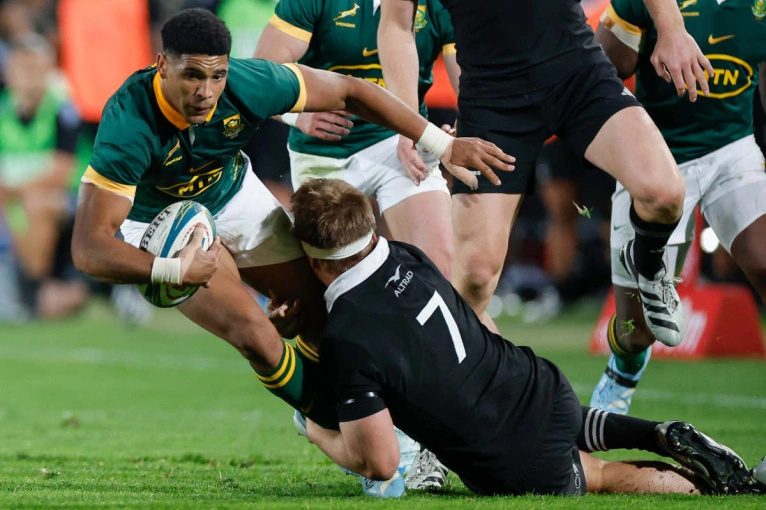 Feinberg-Mngomezulu was handed a start, his third in a row, against New Zealand in last year’s Rugby Championship (Photo by Phill Magakoe/AFP via Getty Images)
Feinberg-Mngomezulu was handed a start, his third in a row, against New Zealand in last year’s Rugby Championship (Photo by Phill Magakoe/AFP via Getty Images)
Instead, the coach continued to back Feinberg-Mngomezulu as a starter and Pollard as a finisher for the first Test in Johannesburg, and the Boks went on to win 31-27.
The performance of the bench was particularly decisive in that encounter.
This remains the only sequence of matches in this World Cup cycle where Erasmus has picked the same No 10 in three consecutive matches.
At the time, a number of critics viewed it as the changing of the guard, with Feinberg-Mngomezulu moving ahead of Pollard and Libbok in the pecking order.
But then Erasmus changed the picture again ahead of the second half of the Rugby Championship.
Pollard started at No 10 in the Freedom Cup decider in Cape Town, a high-pressure game played in vastly different conditions to the first Test on the highveld.
Feinberg-Mngomezulu, who was secretly nursing a knee injury at that stage, delivered an unconvincing showing in the second half, yet the Boks hung on for a 18-12 win.
Erasmus ignored the calls from the media and public to drop Libbok ahead of the Rugby Championship title decider… the Boks produced an attacking masterclass to thrash the Pumas 48-7
Plans to develop the youngster further were scuppered, after Feinberg-Mngomezulu underwent surgery and was forced to miss the remainder of the Test season.
This prompted yet another rethink regarding the management of the No 10s.
Erasmus started Pollard and benched Libbok for the fixture against Argentina
in Santiago.
The Boks fought their way back into the contest after half-time, thanks in no small part to Libbok’s tactical kicking and game management.
But when the opportunity to win the game via a late penalty arose, Libbok pushed the chance wide – and the Boks went on to lose by a single point.
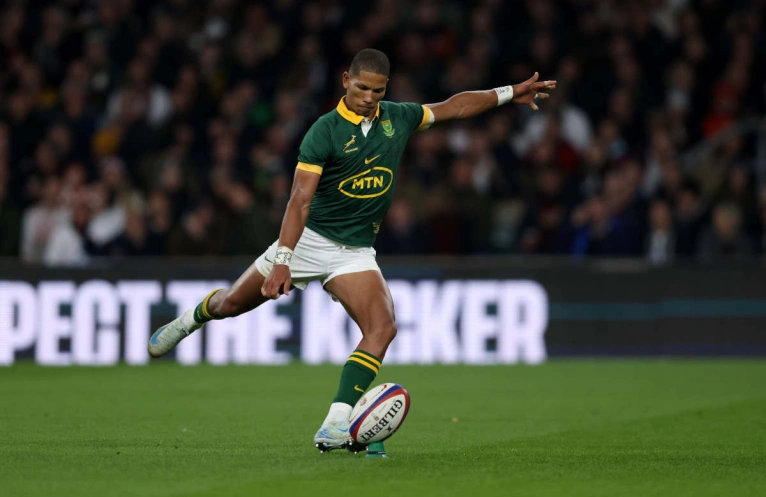 Libbok’s sometimes erratic goalkicking in pressure moments has been a factor in selection strategy (Photo Paul Harding/Getty Images)
Libbok’s sometimes erratic goalkicking in pressure moments has been a factor in selection strategy (Photo Paul Harding/Getty Images)
Erasmus ignored the calls from the media and public to drop Libbok ahead of the Rugby Championship title decider in Mbombela and revisited the dynamic that had proved so successful at the 2023 World Cup.
Libbok was backed to start, with Pollard playing a supporting role in the latter stages.
The Boks produced an attacking masterclass to thrash the Pumas 48-7, and Libbok received due plaudits in the aftermath.
Erasmus showed his hand again on the subsequent tour to the United Kingdom.
Pollard started against Scotland in the opener while the rookie Jordan Hendrikse received an opportunity at No 10 against a struggling Wales in the third fixture.
In the marquee event against England at Twickenham, however, Libbok wore the No 10 jersey, while Pollard was asked to close out the game from the bench. In the end, the Boks won 29-20.
GOAL-KICKING A KEY CONSIDERATION
Last month, the Boks beat the Barbarians, Italy (twice) and Georgia by significant margins.
Erasmus rotated his three fly-halves over the course of the four matches in an attempt to give them sufficient game time in certain combinations ahead of the all-important Rugby Championship.
Perhaps the only significant takeaway from those matches against lower-ranked opponents was the performances from the kicking tee.
The Boks have three outstanding No 10 options, but going by recent performances, only one of them is a world-class goal-kicker at this stage.
Apart from the first Test against Ireland in July 2024, where Pollard converted four of his seven shots on goal, the veteran has been South Africa’s banker, with an 87% success-rate across this World Cup cycle.
Feinberg-Mngomezulu made a statement when he slotted a 55m penalty on debut against Wales at Twickenham, and it’s not hard to understand why he has been touted as the next Frans Steyn.
And yet, there have been times when injuries and perhaps the exuberance of youth have compromised his focus, as seen in the second Test against the All Blacks in Cape Town last year – where he missed two late kicks – and more recently against Georgia in Mbombela – where he missed four of five.
After the latter match, Erasmus explained that Feinberg-Mngomezulu had sustained a hip injury in the build-up, and that the ailment had compromised his goal-kicking process.
With that in mind, it would be unfair to judge the 23-year-old too harshly.
At the same time, many – including Erasmus – would have noted how Pollard came off the bench to nail four from four.
The veteran has not missed a shot on goal for the Boks since his five-from-six performance at Murrayfield last November.
Does this mean that Pollard should start the big games in 2025? Or is it an argument for his inclusion on the bench, given Libbok’s goal-kicking shortcomings and Feinberg-Mngomezulu’s inexperience?
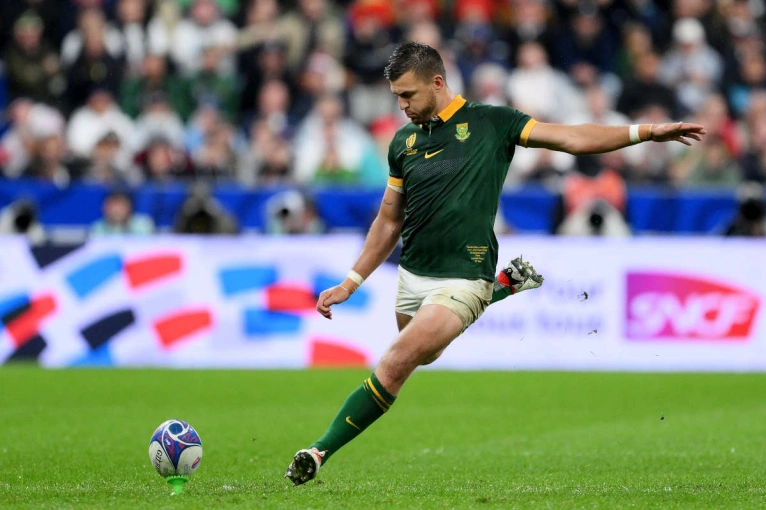 Pollard has repeatedly proved himself a master goalkicker at clutch moments on the biggest stages (Photo David Ramos/World Rugby via Getty Images)
Pollard has repeatedly proved himself a master goalkicker at clutch moments on the biggest stages (Photo David Ramos/World Rugby via Getty Images)
The heavy and possibly wet conditions at Eden Park may also factor into selections.
Pollard has proved himself a wet-weather asset over the years, whereas the Stormers duo of Libbok and Feinberg-Mngomezulu struggled in the northern hemisphere during the latter stages of the recent United Rugby Championship campaign.
Does Erasmus revert to the 2023 World Cup final template, backing Pollard to play the full 80 minutes, and should he load his bench with seven forwards?
It’s an attractive option, now that the versatile Willemse is back in the squad after a long injury-enforced absence.
The double World Cup winner has the ability to cover fly-half, inside centre and full-back, and will add value in a seven-one bench dynamic.
That said, he has had his own goal-kicking issues over the years – and is no longer a frontline option at franchise level.
Some might see that as the conservative option, even though the seven-one and six-two bench selections are inherently risky.
The Boks were bold enough to back that strategy in the 2023 World Cup final – when the title was on the line – and they may favour a similarly brave approach in Auckland next month.
Of course, it’s worth noting that Erasmus and right-hand man Tony Brown have shown opposing coaching teams a different tactical picture over the past 18 months.
Erasmus hasn’t been afraid to start the attack-minded Libbok and Feinberg-Mngomezulu in big matches or to balance his bench with three speedy backs, and the team as a whole has shown more ambition with ball in hand.
Everyone will have their own opinion regarding the selections for one of the biggest games on the Test calendar.
For me, Pollard is best suited for the big occasion at Eden Park, as is a forward-heavy Bomb Squad.
Erasmus is under pressure to get his fly-half and matchday selections right, as opportunities to play and win at Eden Park are exceedingly rare.
The Boks last visited the fortress in 2013, while no visiting side has won there since 1994.

